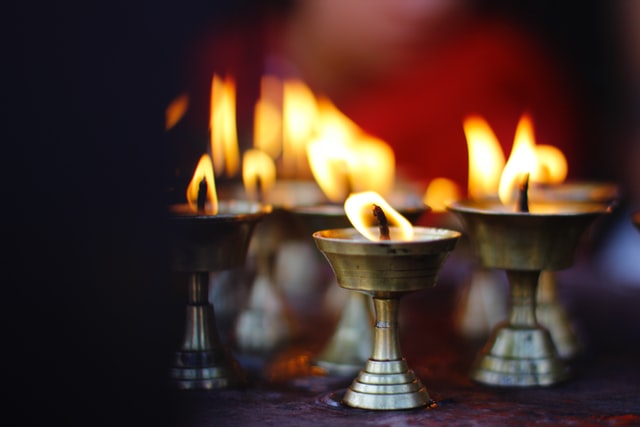
The journey of a young girl who blossomed to a formidable poet
Date : 04/05/2024

The first women poet in the era of Dasa sahitya was Giriyamma. She was born in Ranebennur, hailing from Aravathukalu family. Born to Bhishtappa Jois and Tungamma, her father was a simple and learned Vedic scholar. Once Dasaru (One who surrenders in service of God in composing and singing praises) came to Jois’s home as a guest. The devoted couples expressed their sincere prayer to have a child and Dasaru directed them to visit Lord Venkateshwara and do the seva. And the couple was blessed with Giriyamma. Giriyamma's childhood journey was filled with listening to stories from Ramayana, Puranas, Maharabharata and Dasa Sahitya literature. Her interest towards music and literature was drawn from her father Bhishtappa Jois. (Helavanakatte Giryamma Kakollu Saroja Rao (1994). Chandrika Prakashana)
But at the tender age of four, Giriyamma lost both of her parents. She was then taken care by her uncle (chikkappa) and aunt. On the day of Gokulashtami, she discovered her eternal inner guide when she looked at the way Lord Krishna adorned the silver swing. When she saw Lord Krishna taking baby steps, she could not hold herself back. She immediately took the Krishna idol into her arms (as though the omnipresent was destined to take care of little Giriyamma). From that moment on, she took care of the idol as her own child, as her playmate and a friend. She even introduced the idol to her friends. These were beautiful memories from her childhood. Her daily routine would start with drawing a Rangoli, dining with devaranama. The neighbours used to adore her voice. No one ever expected this little girl to sing jewels of Dasa Sahitya like: “Krishnakoravanji”, “Brahmakoravanji”, “Seethakalyana”, “Story of Chandrahasa” and “The song of shankara ganda”.
During the medieval times, when invasions of kingdoms were rampant, the elementary school education used to happen within the family itself. And once to attend a family wedding, Giriyamma travelled outside her village to Mallebennur. She had heard about the Helavanakatte Sri Lakshmi Ranganatha Temple and was very keen to visit it. It was the Ratha Festival then, and Giriyamma and her friends went to the temple early in the morning. They cleaned the premises, drew rangoli and sang beautiful songs. This is when composer, astrologer and poet Saint Gopala Dasaru met Giriyamma for the first time. He was impressed with her songs and devotion and blessed her immensely.
(Source: madhwayati.blogspot.com)
In accordance with the tradition prevalent in those days, she was married when she was about 10 years to Shyanabogaru Krishnappa, son of Thipparasa from Mallebennur. On the day of marriage, she realised that she was born to witness the journey towards “Oneness of the human soul with the Supreme Consciousness”. She was rather averse to leading a mundane family life. Her father-in-law Shyanabogaru Krishnappa and his son supported her spiritual journey. She persuaded her husband to marry another woman and she began to lead an ascetic life. This was the moment when Giriyamma had to face difficulties in her spiritual and intellectual pursuit.
She had to face the wrath of many of the relatives of her husband’s family. Many were staunchly opposed to Giriyamma composing Keerthanas. Many people mistreated her as a childless mother. They even questioned her ability to have children. Only a few realised that she was born as the mother of Lord Ranganatha. Giriyamma never wanted to be a scholar and gather fame. All she wanted was to be the mother of Lord Ranganatha. Despite all the difficulties, she smiled at everyone with love.
Once Sri Sumateendra Sripandagala from Mantralaya had come to Malebennur and stayed at Sri Helavanakatte Sri Lakshmi Ranganatha Temple. After the Mahapooja and Mangalarathi were over, the Sri Sumateendra sked Giriyamma to come and take the Thirtha (prasad). Some people discouraged him not to give her the prasad first. As her hand stretched forward, Sri Sumateendra Theertharu observing her hand said that “the Lord was her son, and her hand had the characteristic of Devaki, her palms were that of Kausalya’s character and Lord Ram is sitting on her lap and playing and requested her to show him Lord Balakrishna calling her Yashodamma”. These mystical incidents are composed as poems and are sung in praise of equanimity.
Most of her literary works, Ankita nama Ankitha nama appear in the "Helavanakatte Ranga". One of her versatile works is Chitrapata Ramanayana. Giriyamma authored more than forty songs, and five narrative poems, all these poems were composed based on her daily routines, starting right from her Rangavalli to Ranganatha, her son’s favourite food to supreme consciousness and living experiences of mundane. The best-known among which is the devotional piece Chandrahasana Kathe. In a prayer poem about famine, Giriyamma wrote:
Women are taking out in vessels
Water from the well gone dry
While bringing it, they think all day:
O Hari, send the rain to us soon
(Helavanakatte Giriyamma, Shiva Prakash (1997), p. 201)
Her work is one of the first by women in the history of Kannada literature. The Universal Motherhood in her words and compositions highlights the normal lives and activities with abundant scholarly knowledge. Her words reflect forgiveness and mindfulness towards life. Each stanza is a module for social skills, value and ethics. Those who are pursuing a career as a life coach, mentor and transformative learning should read Giriyamma’s works. She was a little girl without formal elementary education. She overcame all the odds in life and took a meaningful and purposeful decision. And Giriyamma composed a huge body of literary work during those times itself. How did she pack so much wisdom in her words?
Dr. Sindhuja C V is Post Doctoral Research Associate and Prof Ashok H S is Visiting Professor, Center for Education and Social Studies.
Tags :
Note: Your email address will not be displayed with the comment.